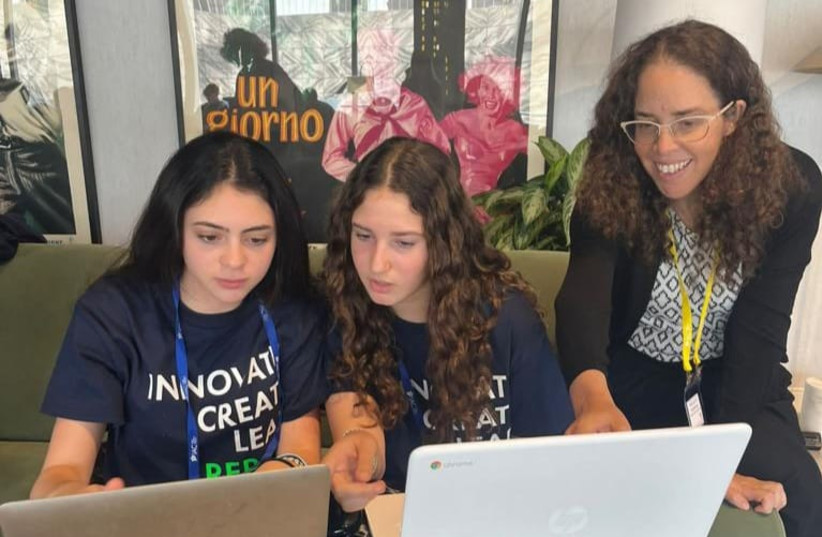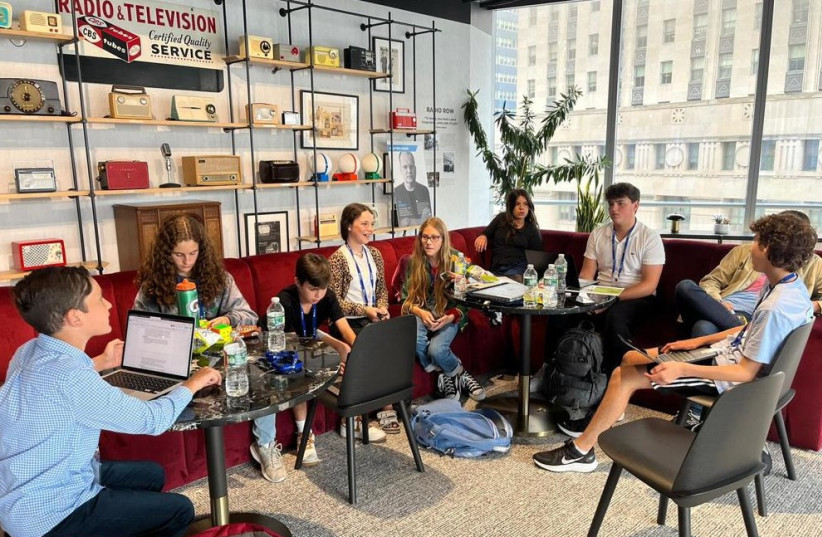Amid the towering skyscrapers and vibrant energy of New York City’s financial district, dozens of Israeli-American and Jewish teens embarked on a transformative educational endeavor recently.
The Summer Hackathon 2023, part of the Israeli-American Council’s Eitanim program, provided young teens in 7th to 12th grades with the opportunity to delve into the complexities of markets, investments, and economic principles.
“I chose to be a part of the hackathon because as an Israeli teen girl, the hackathon allowed me to be surrounded by successful, intelligent, Israeli mentors and other peers who are just like me and fascinated by a future in business,” Ella, 14 and a freshman in high school, told The Jerusalem Post.
Over two days, the teens, hailing from New York and New Jersey, learned about social-impact investing from major Israeli-American entrepreneurs and competed in a hackathon to pitch investments in Israeli tech start-ups focused on diversity and equality, education, health, and renewable energy. They were also given a private tour of Wall Street.
During the simulation, they were presented with a number of scenarios to invest in companies in fields such as renewable energy, ed-tech, healthcare, and diversity and equality.

How did the hack-a-thon work?
The teens were given $10 million to invest in companies and provided two investment opportunities with different portfolios and scenarios. After careful analysis, they had to decide which company to invest their money in, taking into account financial factors as well as social impact.
“I feel that I learned so much from the experience. Not just about entrepreneurship but as well as learning to be a team player, learning to be a leader, and most importantly, learning how to take constructive criticism and use it to my benefit and improve,” said Ella.
The hackathon draws upon the basic premise of the IAC’s Eitanim program of project-based learning, or PBL, which leads youth through hands-on exercises and experience.
“The hackathon was a truly unique experience, because it allowed the teens a real chance to step into the shoes of investors and make financial decisions, teaching them necessary terminology and essential skills needed in today’s world,” Daphna Tsachor Naveh, chief product officer at Wochit and a hackathon mentor, told the Post.
“It was nothing like they had experienced beforehand,” she said. “And being on Wall Street, in the center of this global financial district and the atmosphere really motivated the teens and allowed them to absorb so much knowledge in a really hands-on way.”
Tsachor Naveh will be entering her third year of volunteering with Eitanim and, like many of the other mentors, has drawn upon her extensive expertise in the business world.
“Both my children are enrolled in the Eitanim program and when my oldest daughter had a demo day and presented her incredible yearlong project, I realized how similar the process is to my day to day,” she recalled. “That very moment I realized that I wanted to volunteer and impart the knowledge and skills I have acquired to the next generation.”

Naveh moved to the US from Israel eight years ago with her family. She said that while the education system in the United States is “amazing and great academically and athletically,” it has one “missing point.
“What has made Israel the Start-Up Nation is working on creativity and thinking outside of the box, something that the American school system mostly lacks, and so the hackathon is an opportunity to instill in them this Israeli culture and equip them with real-life skills,” she said.
Today there are over half a million Israeli-Americans living in the US. The IAC was established to build an engaged and united Israeli-American community that preserves and strengthens Israeli and Jewish identity, primarily for the next generation.
Dana Eyal, Eitanim’s national director, told the Post that Eitanim was established in 2017 with the aim of connecting youth to Israel through innovation and entrepreneurship.
“The IAC builds communities and the idea behind Eitanim is to engage youth to become a part of a community and maintain a connection to Israel alongside providing them skills that are imperative to their success,” she said. “We bring out that ‘Israeliness’ in them and teach them how to think outside the box, how to look at problems, and how to solve them.”
Since its establishment, Eitanim has seen thousands of Israeli-American youth participating in the year-long college-accredited program (UCSD – University of California San Diego).
"My experience at the Hackathon taught me a lot about the process of investing and how it works. As I was learning about this, I also improved my teamwork and presenting skills."
Yuval, 14, Hack-a-thon participant
“The program is built on three facets- gaining skills through simulations and interactive workshops, building a project from the idea stage, and an accelerator and final project pitch competition,” Eyal said. “We also have regional hackathons, like the one held in Wall Street, and national hackathons, with our next taking place in July 2024 in Los Angeles.”
Among the projects include developing an emotional AI platform for students to check in with their teachers in school, and installing workout bikes in school that generate electricity.
Yuval, a 14-year-old Israeli-American freshman, told the Post that she has been participating in the Eitanim program for two years and was excited when she heard about the Wall Street hackathon.
“Investing is a topic I’m very intrigued about and this sounded like a great opportunity to learn more about it,” she said. “My experience at the hackathon taught me a lot about the process of investing and how it works. As I was learning about this, I also improved my teamwork and presenting skills.”
Yuval credits the program with providing her with confidence to develop and present her ideas.
Now, both Ella and Yuval are excited to start their next year in the Eitanim program.
“This year will be my third year participating in the [Eitanim] program,” Ella said. “I was first introduced to the program by my family members. My two older siblings were a part of the Eitanim program, and my parents were mentors.”
“Every year is a different project. The project is only revealed on the first day of the Eitanim program, which is yet to happen. But I’m very eager to see what it is,” she said.
